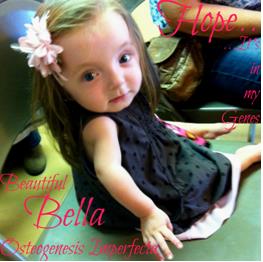Transplantation of Mesenchymal Stem Cells in Osteogenesis Imperfecta Is Safe and Effective

3 years old Bella has survived over 40 broken bones since birth
Submitted By: Mindy ParkerMindy
Osteogenesis Imperfecta (OI), also known as brittle bone disease, is a congenital bone disorder characterized by brittle bones that are prone to fracture. People with OI are born with defective connective tissue, or without the ability to make it, usually because of a deficiency of Type-I collagen.

The Taiwanese girl with her clinician
Researchers from Taiwan, Sweden, Singapore, and etc collaboratively completed a clinical trial of pre- and postnatal transplantation of fetal mesenchymal stem cells to treat OI. Research results demonstrate the potential of ameliorating skeletal damage using this approach. Two patients with OI received prenatal human fetal MSC (hfMSC) transplantation and postnatal boosting with same-donor MSCs. The first patient was a Swedish girl. She was retransplanted with 2.8 × 106 same-donor MSCs per kilogram at 8 years of age, resulting in low-level engraftment in bone and improved linear growth, mobility, and fracture incidence. A second fetus with OI type IV was also transplanted with 30 × 106 hfMSCs per kilogram at 31 weeks of gestation and did not suffer any new fractures for the remainder of the pregnancy or during infancy. The patient followed her normal growth velocity until 13 months of age, at which time longitudinal length plateaued. A postnatal infusion of 10 × 106 MSCs per kilogram from the same donor was performed at 19 months of age, resulting in resumption of her growth trajectory. Neither patient demonstrated alloreactivity toward the donor hfMSCs or manifested any evidence of toxicities after transplantation. Their findings suggest that prenatal transplantation of allogeneic hfMSCs in OI appears safe and is of likely clinical benefit and that retransplantation with same-donor cells is feasible.



 H&B
H&B
 Srhealth
Srhealth